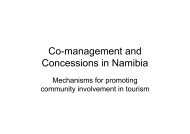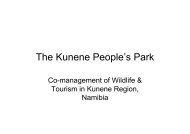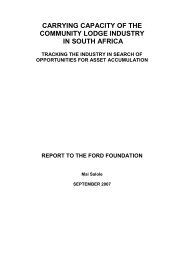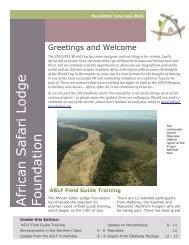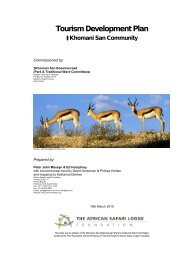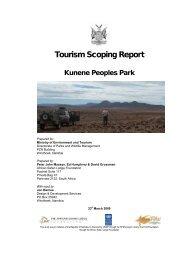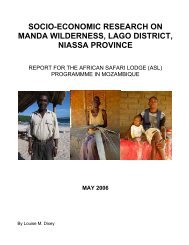Evaluating outcomes at Madikwe and Makuleke by Peter John Massyn
Evaluating outcomes at Madikwe and Makuleke by Peter John Massyn
Evaluating outcomes at Madikwe and Makuleke by Peter John Massyn
Create successful ePaper yourself
Turn your PDF publications into a flip-book with our unique Google optimized e-Paper software.
eturns associ<strong>at</strong>ed with one of the principal factor inputs (financial capital) of the tourismmarket. Instead, they have opted to rent their l<strong>and</strong> to firms th<strong>at</strong> raised capital priv<strong>at</strong>ely.And there are lingering questions regarding the deal between the <strong>Makuleke</strong> CPA <strong>and</strong>Wilderness Safaris, particularly regarding the long-term opportunity costs associ<strong>at</strong>ed withthe closing of the hunting option <strong>and</strong> the granting of an exclusive lease over all the<strong>Makuleke</strong> l<strong>and</strong> to a single firm for a period of 45 years. These concerns require furtherconsider<strong>at</strong>ion as the <strong>Makuleke</strong> experience unfolds, but they may point to a failure in thetechnical advice received <strong>by</strong> the <strong>Makuleke</strong>, especially during the second-round ofbargaining th<strong>at</strong> led to the Wilderness deal.4. CONCLUDING THOUGHTSThe <strong>Madikwe</strong> <strong>and</strong> <strong>Makuleke</strong> cases have figured prominently as pilot projects. Each wasexplicitly designed to demonstr<strong>at</strong>e how poor rural communities can use formal l<strong>and</strong> rightsin core protected areas to achieve high levels of particip<strong>at</strong>ion in the tourism market. But interms of actual impact the experience of the two cases is different. The <strong>Madikwe</strong> approachseems set to stimul<strong>at</strong>e wider market change with the incorpor<strong>at</strong>ion of the model into theindustry mainstream. This is mainly because it fits well with both the market <strong>and</strong> thest<strong>at</strong>e’s framework for public-priv<strong>at</strong>e-partnerships. By contrast, the <strong>Makuleke</strong> experiencehas not spread widely, mainly because of resistance from within the conserv<strong>at</strong>ion sectorof the st<strong>at</strong>e. In the former case, broader institutional conditions favour replic<strong>at</strong>ion; in thel<strong>at</strong>ter, it would appear they do not.This leads to a final thought on the positive impact of the two cases in overcoming thetraditional divide between the first <strong>and</strong> the second economies. In both cases, the grantingof formal l<strong>and</strong> rights <strong>and</strong> the resultant agreements with external actors have pulled thecommunity partners into the formal economy. By going into partnership with establishedtourism firms, the community partners have entered a steep learning curve. This isreminiscent of the challenge described <strong>by</strong> Schirmer: “<strong>by</strong> becoming involved in poor areas<strong>and</strong> striving to construct effective workable business ecosystems, the corpor<strong>at</strong>ions drawpoor people into the market system <strong>and</strong> provide them with wh<strong>at</strong> Prahalad calls‘Transaction Governance Capacity’. This entails a learning or mentoring process where<strong>by</strong>poor people become trained in the ways of entering into <strong>and</strong> enforcing contracts whilesimultaneously developing a commitment to honour the legal system. By benefiting fromthe workings of the market poor people begin to underst<strong>and</strong> th<strong>at</strong> respecting contractscre<strong>at</strong>es a win-win situ<strong>at</strong>ion for them <strong>and</strong> the firm they are engaging with.” 2929 Schirmer, 2005: 10. This suggests an interesting avenue for future research, which would build on thework of Prahalad <strong>by</strong> focusing on the role of priv<strong>at</strong>e business partners in the n<strong>at</strong>ure tourism sector as/28



